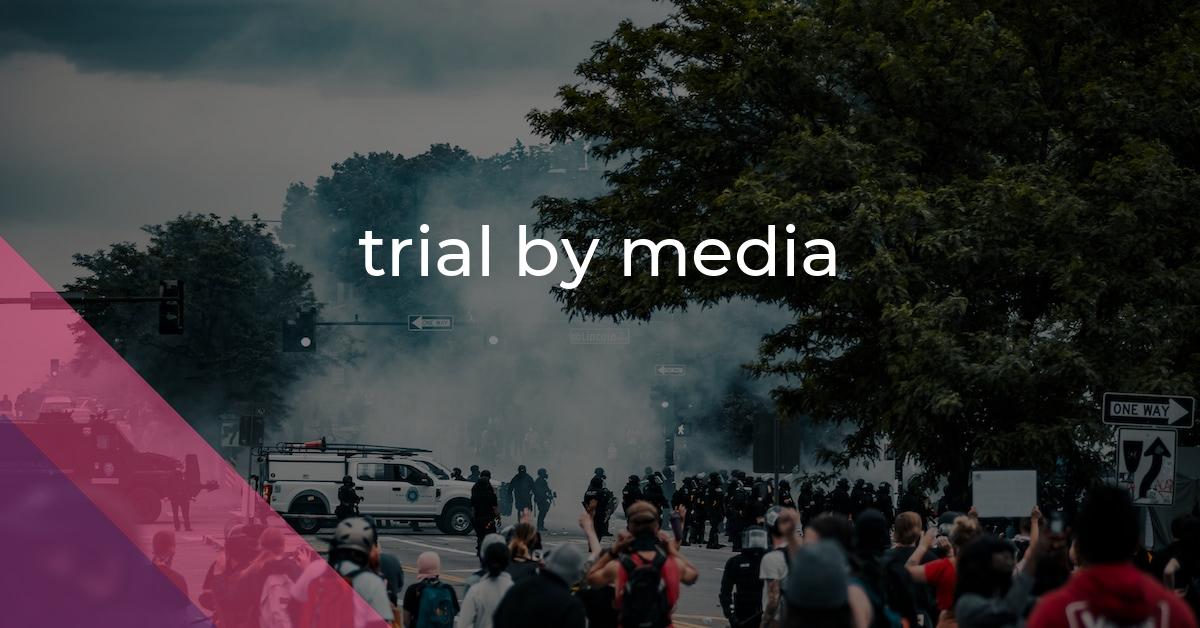trial by media: Idiom Meaning and Origin
What does ‘trial by media’ mean?
The idiom "trial by media" refers to the phenomenon where a person's guilt or innocence is determined and judged by the media before a legal trial takes place. This can potentially impact public opinion and prejudice the outcome of a fair and impartial trial.

Idiom Explorer
The idiom "under the radar" means to go unnoticed or undetected, especially in a way that avoids attention, scrutiny, or surveillance.
The idiom "under the microscope" means to be closely examined or scrutinized for flaws or faults.
The idiom "under the influence" means being affected by drugs or alcohol, typically to the point of impaired judgment.
The idiom "under the impression" means to believe or think that something is true or to be convinced of something, often based on limited or mistaken information.
The idiom "under the gun" means to be under pressure, facing a tight deadline or in a difficult situation where one is expected to act quickly and decisively.
The idiom "under a cloud" means to be in a situation where one's reputation or character is under suspicion or in a state of disrepute.
The idiom "try it on" means to test or experiment with something, typically a theory or idea, to see if it works or is effective.
The idiom "tried and tested" means something that has been proven to be effective or reliable through previous experience or testing.
"Trial by fire" means to be tested or judged in a difficult or challenging situation, often used to describe a demanding initiation or a rigorous test of one's abilities or character.
The idiom "trial balloon" refers to a tactic where an idea or proposal is tested without commitment. It allows the originator to gauge people's reactions before making a final decision.
Media as Judge
Trial by media refers to the phenomenon where a person's reputation and guilt or innocence are determined by the media, rather than a court of law. This idiom is commonly used to describe situations where media coverage of a trial or investigation shapes public opinion and affects the outcome of the case.
The idiom trial by media gained prominence in the 1980s and 1990s during high-profile criminal trials that received extensive media coverage. Cases like the O.J. Simpson trial and the Clarence Thomas Supreme Court confirmation hearings exemplify how media attention can influence public opinion and potentially impact the legal process.
The trial by media idiom encapsulates the concern that media coverage, often prioritizing sensationalism, can quickly establish guilt or innocence in the court of public opinion without considering all available evidence. This can result in biased representations and premature judgments before a thorough legal process takes place. The instantaneous nature of 24-hour news cycles and the widespread accessibility of information have further fueled and exacerbated the trial by media phenomenon.
While primarily focused on criminal cases, the trial by media idiom can also be applied to politics and business. In politics, the media's portrayal and coverage of political figures significantly impact public opinion and electoral outcomes. Similarly, scandals and controversies involving corporate entities face intense media scrutiny, swiftly tarnishing reputations and influencing public perception.
The implications of trial by media are subject to ongoing debate and discussion. This idiom highlights the power and responsibility of the media in shaping public discourse and influencing judicial processes. Critics argue that the media's role as a gatekeeper of information should be balanced with ethical considerations to ensure fairness and accuracy in reporting. On the other hand, proponents argue that the media plays a crucial watchdog role by holding powerful individuals and institutions accountable.
stand trial is an idiom often used in relation to trial by media. In legal terms, standing trial refers to the process of an accused person being tried in a court of law. However, in the context of trial by media, the idiom can be used metaphorically to indicate that someone is being publicly scrutinized and judged without going through the official legal proceedings. The media coverage itself becomes a sort of "trial" where guilt or innocence is determined in the court of public opinion rather than in an actual court.
Court of public opinion is another idiom closely related to trial by media. It describes the idea that public opinion, heavily influenced by media coverage, can act as a virtual courtroom where opinions and judgments are formed. The court of public opinion can shape public perception and potentially impact the outcome of a case, even before the legal process takes place. In cases where trial by media occurs, the court of public opinion often plays a significant role in determining reputations and influencing decisions related to the accused.
drive-by media is an idiom used to criticize media organizations for their perceived rush to judgment and sensationalism. The term "drive-by" implies a quick and superficial approach, lacking in depth and nuance. In the context of trial by media, the idiom can be used to express the notion that media coverage tends to be sensationalized and focused on generating attention rather than providing a fair and balanced representation of the facts. The emphasis on short attention spans and immediate impact in the media often overlooks the complexities and intricacies of the legal process.
trial by fire is an idiom that refers to a difficult or challenging situation that tests someone's abilities or character. In the context of trial by media, this idiom can be used to describe the intense scrutiny and public judgment that individuals face when their reputations and innocence are at stake. The media coverage becomes the "trial by fire" where individuals are subjected to intense public scrutiny and their abilities to navigate the situation and preserve their reputation are put to the test.
media darling is an idiom used to describe a person or entity highly favored or celebrated by the media. In the context of trial by media, this idiom can be used to highlight the potential bias and favorable treatment that certain individuals or entities may receive in media coverage. In some cases, media darlings may receive more positive coverage, influencing public opinion and potentially impacting the outcome of a case. The idiom points to the influence and power the media wields in shaping public perception and the potential for favoritism to affect the course of justice.
Example usage
Examples of how the idiom *trial by media* can be used in a sentence:
- A politician's reputation was destroyed by trial by media when false allegations were spread by news outlets.
- The celebrity's trial by media caused public opinion to sway before any evidence or facts were presented in court.
- The company faced a trial by media after a scandal was leaked, leading to public backlash and damage to their brand.
More "News" idioms



